
This doesn't surprise me in the least. The barbarians want to take them back to the 8th Century with no running water, electricity, or even adequate health care.
Read more @ Worsening Conditions in Mosul Iraq Business News
Follow along with the video below to see how to install our site as a web app on your home screen.

Note: This feature currently requires accessing the site using the built-in Safari browser.

The dam, located on the Tigris River just north of Mosul, is the largest in the country. Built in 1984, the dam is structurally flawed and has required constant maintenance and shoring up with cement grout. At full capacity, the dam can hold 11 cubic kilometers of water. If it were to burst at that level, a huge wave would roll down the river, potentially killing hundreds of thousands of people who are not able to move out of the way in time. "The approximately 500,000 to 1.47 million Iraqis residing along the Tigris River in areas at highest risk from the projected floodway probably would not survive its impact," according to a statement released by the U.S. embassy in Baghdad.
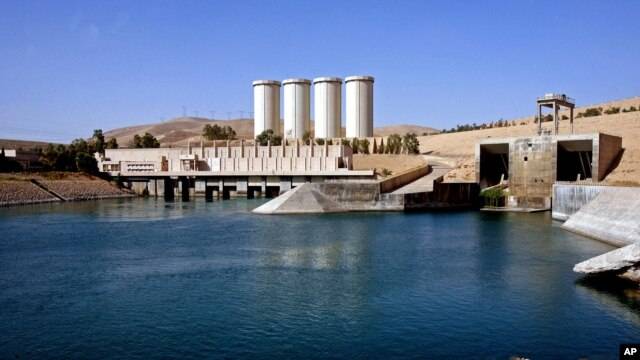
A general view of the dam in Mosul, 360 kilometers (225 miles) northwest of Baghdad, Iraq. The dam, located on the Tigris River just north of Mosul, is the largest in the country.
Flood would reach Baghdad, devastate infrastructure
Flood waters could reach depths greater than 15 meters in some parts of Mosul city in as little as one to four hours, giving residents little time to flee. In three to four days, the water would reach Baghdad, swelling the river that dissects the city by some 10 meters, and likely forcing the closure of the capital's international airport. The 500-kilometer flood path would also damage or destroy large sections of infrastructure, and knock power plants offline, causing the entire Iraqi electricity grid to shut down. Farmland would also be severely damaged.
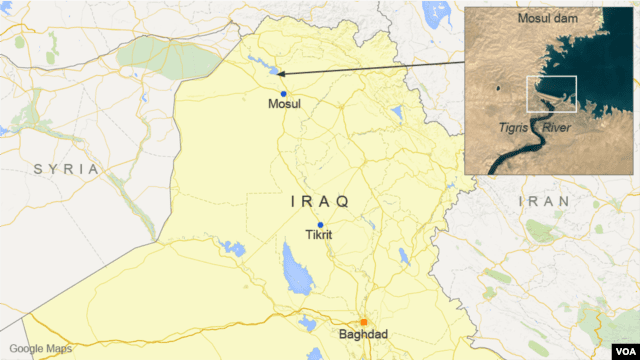
Mosul and the area down river are largely controlled by Islamic State militants, which could complicate any international relief effort, the U.S. embassy said. After months of downplaying the seriousness of the risk, the Iraqi government recently acknowledged the need to strengthen the dam and contracted the Italian engineering firm Trevi to repair and maintain the structure. NGOs and humanitarian agencies have already started work on contingency plans in case the dam bursts.
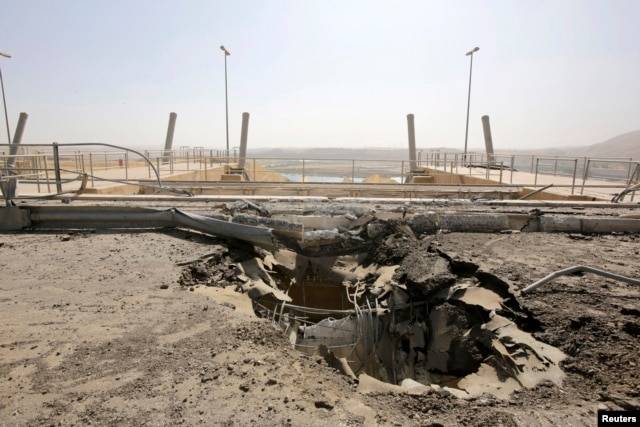
A crater at the entrance of Mosul Dam. NGOs and humanitarian agencies have already started work on contingency plans in case the dam bursts.
But it is unclear what would happen to the hundreds of thousands of vulnerable people already displaced by violence in Iraq. Although it said had no specific information as to when the dam would collapse, the U.S. embassy said an early warning system and clear evacuation procedures could reduce the loss of life. The U.S. embassy public warning comes after weeks of private notices calling on the international community and the government in Iraq to be prepared for such a disaster.
US Warning of 'Catastrophic Failure' of Iraq's Mosul Dam
After more than a year and half of living under the Islamic State group, Arif and his family were free. He and about 6,000 others are now in a small Kurdish-run camp set up in the gravel and mud to take in villagers fleeing Islamic State as the Iraqi army started its push to retake the area south of Mosul.
Life under Islamic State rule
A day of interviews with five different men, some single, some fathers, some teenage sons, revealed what life was like under Islamic State. Most did not give their full names out of fear that IS would take revenge on relatives left behind. Men were fined or whipped if their women were seen without the full face-covering niqab. Men were fined or whipped if their beards were not long enough. Men were beaten if they were found with cigarettes. Children in school were taught how to count with bullets. A former Iraqi military man himself, Arif was one of many Sunnis who stayed in their villages when the largely Sunni extremist group Islamic State took over in 2014.
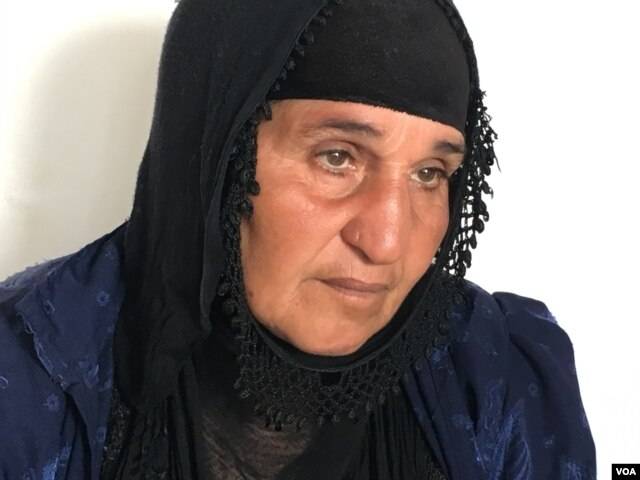
Iraqi village woman who has survived 13 years of war and 2 years under IS, now in a refugee camp outside Makhmour, Iraq
And like several of the men who managed to escape to this camp, Arif described a life that soon turned brutal, then unlivable. Jobs were scarce and badly paid or dangerous. Families were running out of money. Desperate for money themselves, IS members were running extortion rackets, ranging from cigarette sales to human trafficking. Anyone affiliated with the Iraqi government, like the former police, had to pay IS a $2,000 “repentance” bond, or be killed, they said. Unable to pay, many just hid in their homes. IS also offered to smuggle people out -- for a fee of anywhere between $300 to $2,000, they said. “It works two ways,” said Ahmed, one of a crowd of some 20 men who wanted to tell their stories, but did not want to give their full names. “Most IS members get paid 60,000 dinar ($50) a month which is very little, so they use this (smuggling) to get money for themselves,” he said. Or, when IS in the area was running low on money, they would collectively “raise as much money as they can and then release some of the people."
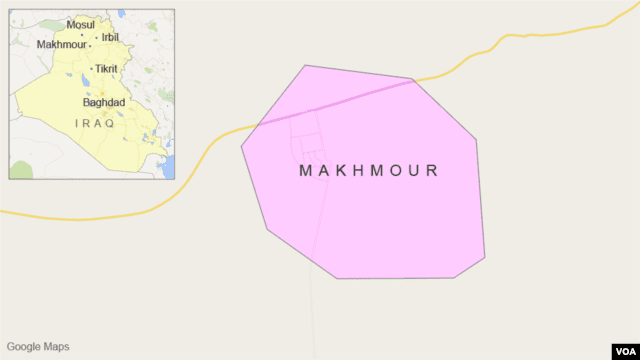
Arif, standing slightly taller than the crowd, stuck his hand into the middle of the circle holding a pack of cigarettes and described another favorite IS scheme. “This pack of cigarettes usually costs 500 dinar (50 cents). Under IS, it costs 5,000 dinar ($5). So, an IS person comes to you and convinces you to do some business selling cigarettes to the neighborhood. Once you have the merchandise, they send another IS guy who whips you 75 times, takes the cigarettes and all the proceeds you have made,” he said. In another version of the same extortion game, when all the cigarettes were sold, a high-ranking IS member from Syria would come and collect all the money, Arif said. Teenager Saifuddin Mohamed, who ran away April 7, said he tried to make money on the cigarette scheme to feed his family, but got beaten for it. “IS took me and beat me badly for selling cigarettes. It was a warning,” he said, asking that his photograph not be taken. “After that I stayed home.”
Breakdown of education system
The church was looted and the clock on the tower of the building was destroyed last year, but the militant group destroyed the church by detonating several explosives. Mosul has been under IS-control since June 2014.
The church was paid for by the wife of Emperor Napoleon III, Empress Eugenie of France, as a reward to the Dominican Order Roman Catholic religious sect in the 1870s for the friars' attempts to end a typhoid outbreak. The church previously survived a bombing in 2006.
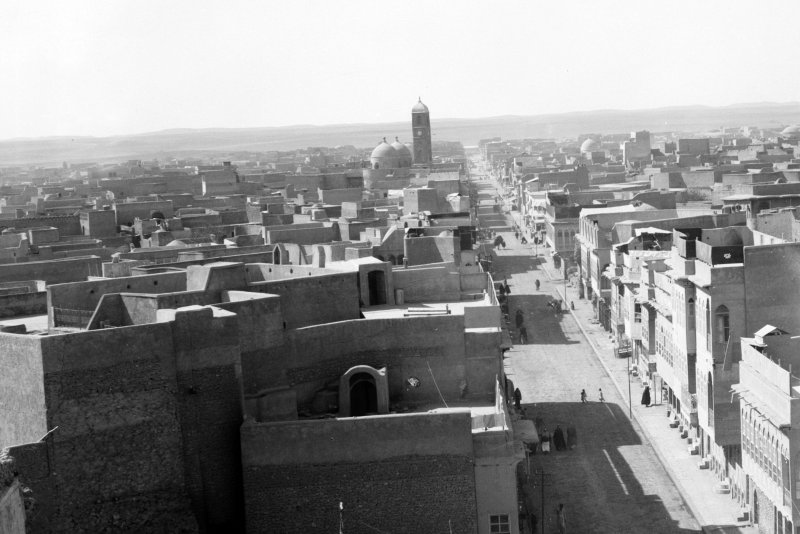
The militant Islamist group has made a habit of razing and destroying cities and ancient cultural icons in the territories it acquires. In the ancient city of Palmyra in Syria, the Islamic State immediately began demolishing ancient ruins considered among the world's most treasured when it seized control in May last year.
The iconic Temple of Bel, the Arch of Triumph and the Temple of Baalshamin were among structures destroyed by the group identified as a terrorist organization by the United States. In Mosul, the Islamic State recently destroyed a 2,000-year-old ancient structure called the Mashqi Gate, also known as the Gate of God. The Iraqi government is in the midst of carrying out a long-term offensive to retake the city of Mosul from the Islamic State.
Islamic State destroys Mosul's historic Christian Clock Church
All you have to do is pay attention to the news to see Iraq is falling apart.
Thanks to Obozo, Shrillary, and Mister Swiftboat.